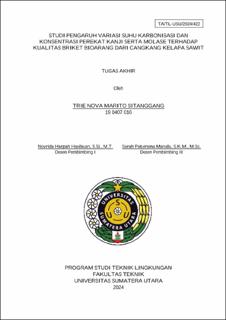| dc.description.abstract | Briquettes are an alternative energy source to fuel made from organic materials or underutilized biomass, such as palm kernel shell waste. Biocharcoal briquettes have potential as renewable energy, and their quality is influenced by the composition of raw materials and the concentration of adhesive used. This study aims to analyze the effect of carbonization temperature as well as the type and concentration of adhesive on the quality of palm kernel shell biocharcoal briquettes. The procedure of this research is making charcoal, making adhesive solution, mixing materials, printing biocharcoal briquettes, and drying briquettes. This study used several variations, namely temperature (300 ℃, 350 ℃, and 400 ℃), type, and concentration of adhesive (starch: 15%, 20%, 25%; molasses: 15%, 20%, 25%). The charring method uses a furnace, and the charring time is 2 hours. The analysis carried out is testing the proximate content (water content, volatile content, ash content, and bound carbon content), compressive strength, and calorific value, as well as emissions from burning briquettes. The results of testing the briquette characteristics will be compared with the quality standards of SNI 01-6235-2000 and SNI 19-4791-1998. Data analysis used is the normality test method and data correlation test. The results showed that the best moisture content was obtained at 3.74% (400℃/starch/25%) and these results have met the quality standards; the best volatile content was obtained at 31.535% (temperature 400℃/starch/25%), but these results have not met the quality standards; the best fixed carbon content was obtained at 65.565% (temperature 400℃/starch/25%); the best ash content was obtained at 2.2% (temperature 350℃/starch/25%) and these results have met the quality standards; the best compressive strength was obtained at 39.908 kg/cm2 (temperature 350℃/starch/25%) and these results have met the quality standards; and the best calorific value was obtained at 6561 cal/g (temperature 400℃/molasses/25%) and these results have met the quality standards. Increasing the carbonization temperature will also increase the value of bound carbon content, ash content, calorific value, and compressive strength of briquettes. Different types of adhesives can affect the quality of bio briquettes, where bio briquettes with starch adhesives are of better quality than bio briquettes with molasses adhesives. In contrast, the use of various adhesive concentrations has little effect on the quality of bio briquettes. However, increasing the adhesive concentration will also increase the moisture content, volatile content, ash content, calorific value, and compressive strength of the briquettes. In addition, CO gas emissions resulting from burning the briquettes have values that tend to be high ranging from 549 ppm - 2064 ppm. Because the CO gas emission test results on biochar briquettes still tend to be high, these briquettes are not suitable for use in open burning without APPU or for use by the community. However, these briquettes are ideal for use as boiler fuel in industry. | en_US |


